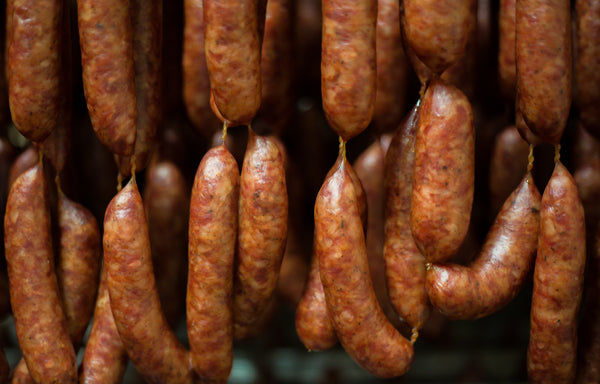
Edwards Hickory Smoked Sausage - Now Made with 100% Heritage Pork!
All photos courtesy of Edwards Virginia Smokehouse

Team Heritage is so proud to have just sent 1000lbs of our pasture raised heritage breed pork shoulder to Sam Edwards. Edwards world famous hickory smoked sausage, a staple throughout the South, is now made with 100% heritage breed pork — exclusively for Heritage Subscribers!
Our business, Heritage Foods, hinges more on the shoulders of Sam Edwards than anyone else as he buys thousands upon thousands of our hams each year to make his delicious and acclaimed Surryano prosciutto-style long-aged ham! So it is no small statement for us to make that we think that his sausage, not his Surryano, is the best product he is producing.
The Edwards Hickory Sausage comes from a 1930’s recipe from Sam’s grandfather. Real sage, as opposed to oil of sage, improves the flavor greatly and is the predominant flavor in each bite. His natural casings impart a better flavor than collagens or plant-based casings. Oak was used as the smoking agent until the 1980s when the flavor profile brought on by Hickory wood couldn’t be denied.
When left in the fridge at 35-38 degrees, the sausage continues to change over time and after a couple weeks it develops a spectacular twang, similar in flavor to Lebanon bologna, or even slim jims but so much better.
The process for making this Southern staple from start to finish involves the Edwards’ grinding the 75% lean meat into coarse ground and then mixing in the sage forward seasonings. The links sit in a cooler at 38 degrees for 4 days and are then stuffed into natural casings and hung on smokehouse racks for 2 more days to dry out naturally. It is now that the links enter the 110 degree Smokehouse to receive the signature Edwards smoke for 16 hours. The temperature is pushed up towards 150 until the internal temp reaches 147 degrees. Finally they pull the sausage and chill overnight.
Sam recommends being careful not to overheat the meat during any part of the cooking or smoking process or else the casings risk getting too rough. Don’t cook in a microwave if you can avoid it! Sam recommends Parboiling as that method helps tenderize the casing.

